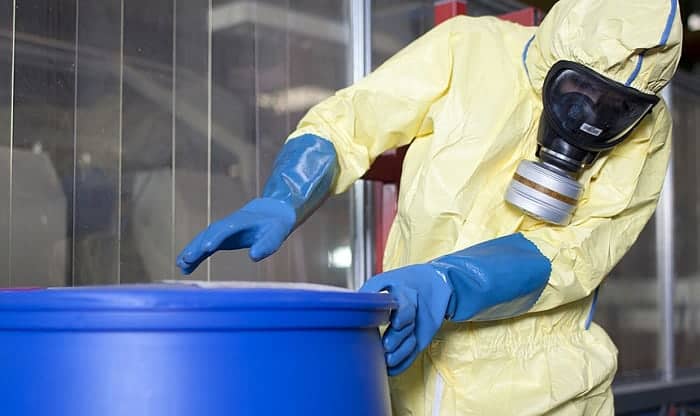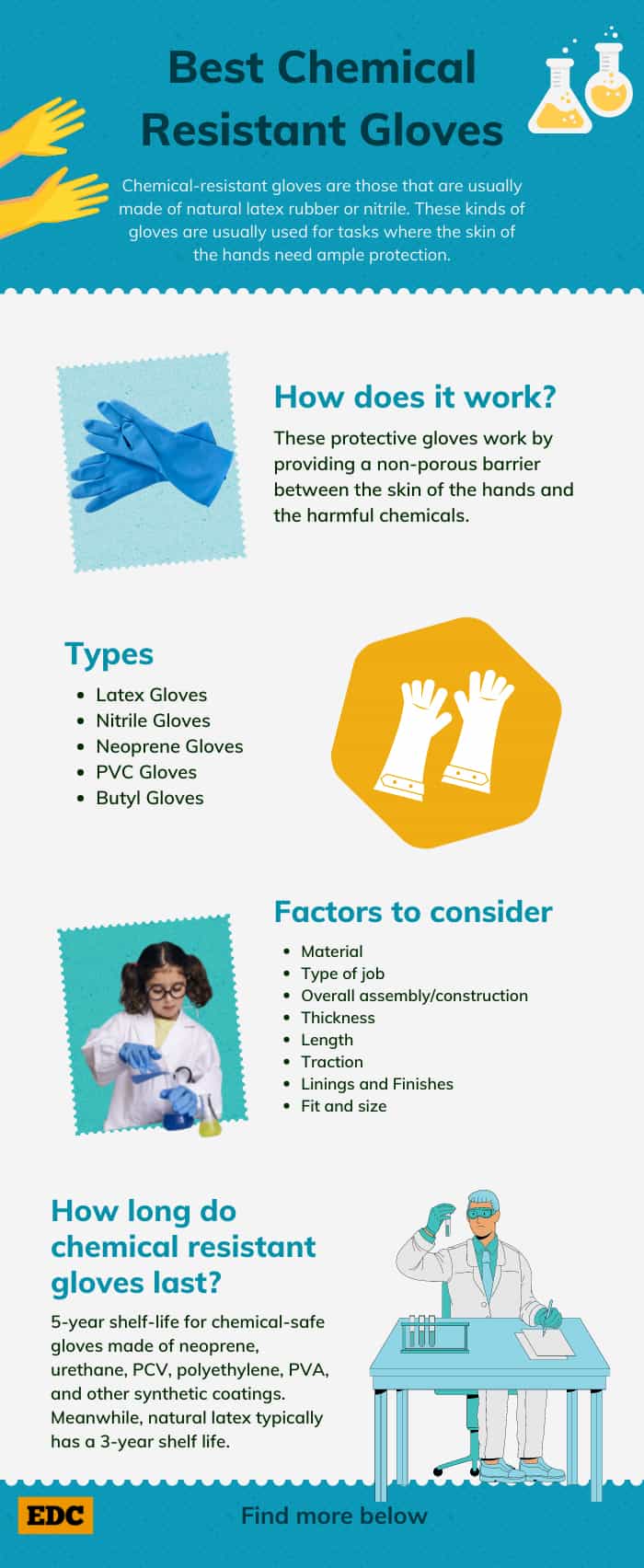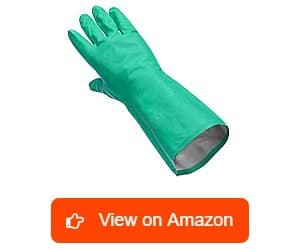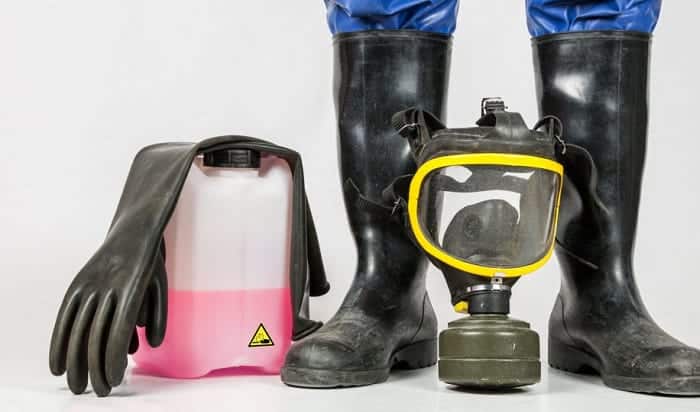Imagine what your life will be like if you do not have full use of your hands. It would not be quite as pleasant as it is right now. This is why you need to protect your hands as much as you can, especially if you often use them in your line of work, such as if you are a mechanic, chemist, or electrician.
Regardless of what your profession is, you will always be using your hands. This is why when you are tasked with handling caustic materials or any other task where your hands are at risk of getting chemical burns, you need to use the best chemical gloves.
There are many different brands and types of work gloves out in the market today, so picking one can get a little tricky. With this article, though, you will learn all the things that you need to know about work gloves so you can make a well-informed choice when you are out shopping for the best chemical-resistant gloves.
No one likes to waste money on a product that is not worth it. More importantly, you wouldn’t want to use a glove that is not suitable for the tasks you have in mind.
Table of Contents
- 11 Top-rated Chemical Resistant Gloves Reviews of 2023
- 1. UXglove Chemical-Resistant Gloves
- 2. Gastody Chemical-Resistant Gloves
- 3. West Chester 12018-L Chemical-Resistant Gloves
- 4. ThxToms Nitrile Chemical-Resistant Gloves
- 5. Gayisic Nitrile Cleaning Chemical-Resistant Protective Gloves
- 6. Wells Lamont Heavy-Duty PVC Chemical Gloves
- 7. DS Safety N592 Nitrile Coating Chemical-Resistant Work Gloves
- 8. ThxToms Heavy-Duty Chemical-Resistant Gloves
- 9. Atlas 772 Nitrile Chemical-Resistant Gloves
- 10. Tarvol Chemical-Resistant PVC Gloves
- 11. 3M 90021 Heavy-Duty Chemical-Resistant Gloves
- What is a Pair of Chemical-Resistant Gloves
- How Do Chemical-Resistant Gloves Work
- Types of Chemical-Resistant Gloves
- Why Do You Need Chemical-Resistant Gloves
- Buying Guide
- Care and Maintenance
- Frequently Asked Questions
- Conclusion
11 Top-rated Chemical Resistant Gloves Reviews of 2023
1. UXglove Chemical-Resistant Gloves
These gloves are made using durable natural latex that is very strong against the usual forms of damage. If you will be using them to handle caustic chemicals, be assured that these will not suddenly just rip and allow the dangerous substances to get in contact with your hands.
The rubber used in these gloves has undergone a unique vulcanization process that creates a smooth surface that still has plenty of grip. To further enhance the grip of the gloves, the palms and fingers are embossed with a cross-hatch texture.
These are also acid-proof gloves. I have been using them when handling both acidic and alkaline substances and they have protected my hands completely so far. These gloves are not just for hazardous materials handling. They have a multitude of uses.
Mechanics can use these gloves as the rubber repels oil and grease, thus providing them with excellent grip all the time. You can also use these at home as laundry or dishwashing gloves as well as for gardening or cleaning the bathroom.
- Cannot be easily punctured or torn
- Comfortable to wear and does not hinder tactile senses
- Features textured palms and fingertips for improved grip
- Can be used for various tasks, from industrial to domestic jobs
- Highly-resistant to acidic and alkaline substances
- Made of natural latex, which is bad news for those who are allergic to the material
2. Gastody Chemical-Resistant Gloves
If you’re looking for long chemical gloves that can cover your forearms, I strongly suggest that you check out this pair from Gastody. Its materials, construction, and features make it suitable for several household and industrial applications.
Because these heavy-duty chemical gloves are made of latex, they can protect my hands against harsh cleaners, grease, solvents, oils, paints, and varnishes. While the material is not heat-resistant, I’m pleased that it is thick enough to keep my hands from getting scalded by hot water or scraped by abrasive surfaces.
Another strength of these gloves is that the shape of the hands suits any gender. In my case, they are neither tight nor loose, allowing my hands to move naturally. I also like that the wrist is sufficiently wide for me to tuck the sleeves of my lab coat or shirt if needed. Meanwhile, the textured palms and fingers enable me to grip any item properly.
- Resistant against harsh chemicals
- Can be used at home or at work
- Thick enough to protect you against abrasion
- Suitable for men and women
- Promotes natural movement and good grip
- Feels uncomfortably hot to wear
3. West Chester 12018-L Chemical-Resistant Gloves
These gloves are perfect for industrial tasks that involve petroleum products and oil but they can also work great on the usual household cleaning tasks. You can use them when cleaning the bathroom as the cleansers will not eat through these tough protective gear.
The length of these gloves ensures that your entire forearm is completely protected. You can expect them to go up to the elbows of the average-sized adult male. With this amount of coverage and the PVC gloves chemical-resistance, one can use them on difficult and disgusting tasks.
Some examples include unclogging the drainpipe of your koi pond (if you happen to have one) or doing other tasks that require you to dip your entire forearm under the water or other substances. The PVC coating is great at protecting the hands against all sorts of dangerous materials.
However, you should avoid using them when working with strong solvents as they would eat through the PVC lining as if it was nothing. Although the gloves are quite long, they are completely lined with cotton fabric inside. Aside from adding a layer of comfort, the lining also wicks away the sweat coming from the palms.
- Has enough length to protect the entire forearm
- Comes with a full-length cotton lining
- Thick enough to prevent punctures and tears
- Relatively more comfortable to wear compared to similar gloves
- Comes with a protective PVC coating to protect against dangerous chemicals
- The PVC lining easily dissolves when exposed to paint stripper and/or acetone.
4. ThxToms Nitrile Chemical-Resistant Gloves
These work gloves are the perfect household companions as they can protect your hands from every caustic household chemical. These are nitrile gloves that are highly resistant against the corrosive effects of alkaline and acidic compounds commonly found in household cleaning products.
Even some industrial-strength cleaners are no match for these work gloves. I specifically liked how thin these gloves are. At just 15 mils thick (roughly a third of a millimeter), it does not feel like I am wearing anything at all when I am working with these gloves.
Even though they are extremely thin, these protective gloves are highly resistant to abrasions and will not puncture that easily as well. This is an important feature whenever you need to handle potentially dangerous materials.
One of the qualities that I always look for in nitrile glue-resistant gloves is their ability to allow maximum dexterity of my hands. I also make sure that they do not hamper my hands in the least and I found those in these gloves. They are so thin that I almost do not feel them at all. This allows me to work with my hands more efficiently.
Moreover, these gloves have a slip-resistant texturing on the palms and fingertips for increased grip and added dexterity. I discovered that I am much better at working with my hands if I am wearing these gloves.
I also love the flock inner lining of these protective gloves. Aside from preventing the gloves from slipping off my sweaty hands, this inner lining also wicks out the sweat from my hands, making the pair comfortable to wear.
I have always hated wearing rubber gloves before because my hands tend to sweat a lot but that is not a problem anymore when I started using these gloves. The only complaint that I have is that they are a bit too tight when you first use them.
I do not mind the tightness as it does add quite a bit of dexterity. However, if you want to get an almost exact fit, get ones that are one size larger than what you usually use. These will be a bit looser but not so much that they get awkward to use.
- Very thin, feels like you are not wearing gloves at all
- Highly-resistant to common household chemicals
- Provides more dexterity, thanks to the textured fingertips and palms
- Features a flock inner lining that wicks away moisture and prevents gloves from slipping off
- Tear and puncture-resistant to a certain extent
- The sizes are smaller than usual.
5. Gayisic Nitrile Cleaning Chemical-Resistant Protective Gloves
This is one of the best household cleaning gloves that I have ever used. These are made of high-end nitrile, which is more puncture and tear-resistant compared to rubber gloves. Because these are made completely out of nitrile and not rubber, they will not cause allergic reactions to people who have latex sensitivities.
I love that these gloves are durable and that I can reuse them multiple times. This is very surprising seeing as these gloves are paper thin. You can also use them for handling caustic cleaning materials like bleach, strong detergents, and some acids without any problem at all.
Because these gloves are so thin, these do not impede the range of movement of your hands. They will still allow you to use the full extent of your hands and fingers. Even while wearing these gloves, I can still do intricate tasks like screwing on and tightening small nuts and bolts, picking up small items off of the floor, and others.
Moreover, the surface of these gloves is textured, offering more than enough grip even on wet surfaces. As mentioned earlier, these gloves are reusable and the thing that made me love them is that they are extremely low maintenance. You just need to rinse the surface with clean water and hang them out to air dry.
When air drying these gloves, do not allow them to bask under the hot sun as doing so will dry them too much and cause the material to crack. Although I did say that these chemical-resistant gloves Walmart (these are widely available in Walmart and other big box stores) are puncture-resistant, that does not mean that they are puncture-proof.
- Made entirely out of hypoallergenic nitrile
- More puncture and tear-resistant compared to rubber latex gloves
- Thin enough to do delicate tasks
- Features a textured surface, providing better grip
- Highly durable – you can use it multiple times with proper maintenance and care
- Once punctured, they will rapidly get ripped apart.
6. Wells Lamont Heavy-Duty PVC Chemical Gloves
I liked how heavy these gloves felt on my hands. These are made of thick nitrite and cotton lining with a PVC-coated exterior for extensive protection. This made these gloves resistant to damage like punctures and rips. You can rely on them to protect your hands when you are handling hazardous materials.
The PVC lining is what helps make these gloves highly-resistant to acids, petrochemicals, and more. The cotton lining inside does not only make these gloves feel comfortable to use even after hours of use but also prevents sweat from pooling inside and making it swampy and uncomfortable.
The lining also makes it easier for the user to put on and remove the gloves, unlike other thin nitrile gloves that you have to painstakingly stretch over the hands before they can fit properly. I also like that these gloves have very long cuffs that help protect my wrists and forearms in case I accidentally splash some of the stuff onto my hands.
Some people do not like using long cuffed gloves but I can just fold them up when they get in the way. In my opinion, it is always better to have more material covering than too little. The cuff is also loose enough to let enough air circulate inside the butyl gloves.
Combined with the lining, this prevents the inside from getting too warm and clammy, allowing the user to work continuously without any discomfort whatsoever. Although the manufacturers say that these gloves are made for handling harsh chemicals, these are not suitable for strong solvents, like acetone.
- Has a comfortable cotton lining that prevents sweat from pooling inside
- Features cuffs that allow proper ventilation to prevent the inside from getting swampy
- Comes with a tough PVC lining that is resistant to petroleum-based chemicals
- Equipped with long cuffs that provide extra protection coverage for the forearms
- Comes with a textured outer surface for enhanced grip
- The gloves are so thick that the user will lose the tactile feel of your fingers
7. DS Safety N592 Nitrile Coating Chemical-Resistant Work Gloves
The thing about this work glove that I enjoyed is how comfortable it is to use. It does not feel like you are wearing a plastic bag over your hands. The knitted and seamless interior of the gloves is a joy for the skin on the hands while allowing you to make full use of your hands and fingers without too much restriction.
Another great thing about the knit liner in these gloves for chemical is that it wicks away the moisture from your hands. This is beneficial for people like me who suffer from sweaty palms. Using these gloves is always a nice experience. It makes quite a difference from the other gloves that I have worn that felt a bit disgusting once the sweat comes pouring from my hands.
Another impressive quality of these gloves is their chemical protection. These have undergone a barrage of tests by various independent laboratories and they all found that the breakthrough time of caustic materials is well over thirty minutes.
This roughly means that these gloves need to be exposed to caustic chemicals for more than thirty minutes before they can eat through the outer materials. This is good to know when your tasks involve handling dangerous materials.
These gloves come with the company’s patented Hycool Grip Coating, which offers incredible grip regardless if the surface is wet or dry. This is a handy feature for professionals like plumbers who need a good grip on items even on wet conditions. This extra bit of dexterity goes a long way in the industry.
- Comfortable to wear
- Features an inner lining that wicks away moisture away from your hands
- Comes with the Hycool grip coating that provides excellent grip
- Boasts of a breakthrough time of more than 30 minutes
- Completely waterproof
- The brand’s sizing is a bit off and different from those used by most glove manufacturers.
8. ThxToms Heavy-Duty Chemical-Resistant Gloves
The thing that impressed me the most about these gloves is that the entire outside surface is textured to provide the best grip on surfaces, even when wet. When you wear these gloves, you will never lose your grip on your tools ever again.
These rubber gloves are thick enough to resist puncturing but not so thick that you lose the tactile feeling in your fingers. With these gloves, you can still do delicate tasks somewhat, just not the kinds of things that require full hand dexterity and tactile senses.
Because these gloves are tough against ripping and puncturing, you can use them for tasks that require protection against hazardous materials, like when doing deep cleaning in the bathroom, emptying the black and gray water tanks of the RV, and others.
These chemical rubber gloves also have angled thumbs that allow for a full range of motion of all the fingers. I can move my thumb all around without the glove impeding it.
- Comes with a fully-textured outer surface for increased grip
- Just 0.3 inches thick so fingers still have a tactile feeling
- Although thin, they are very durable.
- Angled thumb for a full range of motion
- Can protect the hands against harsh chemicals and hazardous materials effectively
- The sizes are all large.
9. Atlas 772 Nitrile Chemical-Resistant Gloves
These long sleeve chemical gloves are 25 inches long. This means they cover almost the entire length of the arm. Most people think that this is overkill but I beg to differ as these have a lot of practical uses. I have a huge fish tank at home and cleaning it in the past was quite a chore.
However, with the help of these gloves, I can now reach even the deepest corners without getting my hands wet. They are thick and have high resistance to punctures. I also use another pair of these when I need to do some dirty work in the garden, like pruning or transplanting thorny rose bushes.
I can also use them for clearing nasty poison ivy vines from my hedges. These kinds of tasks were dreadful before but I can deal with them easily when I am wearing these gloves. Although these are thick enough to resist getting punctured by rose bushes, they are not so thick that you lose all dexterity of your fingers.
These are still thin enough that you can do relatively detailed work, like working with garden shears, tightening bolts, and doing any other tasks that require quite a bit of hand dexterity. One might think that these look uncomfortable to use but that’s not the case.
The entire length of the gloves is a cotton flock lined for comfort. This lining also prevents sweat from building up inside. I can wear these gloves for over an hour without feeling the need to peel them off to let my arms breathe.
- Has more than enough material to protect the entire arm
- Thick enough to prevent punctures and rips
- Can handle relatively delicate tasks
- Completely lined for comfort and ease of use
- Can protect against many caustic materials and chemicals
- The end can pinch the arms a bit.
10. Tarvol Chemical-Resistant PVC Gloves
Just one look at these gloves is enough to tell you that these are not the ones used for delicate work. These products are seriously tough and beefy, the kind of gloves that you need to use if you want absolute protection for your hands.
Aside from being thick, these also provide serious protection for your wrists and forearms – areas that most nitrile gloves do not cover. These chemical and heat-resistant gloves may be thick but they are still supple and flexible. This means you still have full use of your hands.
This is great when you are using harsh cleansers for cleaning your kitchen or bathrooms. It is also ideal for woodworking purposes, specifically for painting and/or staining wood. These are also great when you need to dispose of potentially caustic substances.
I like that these gloves are not just waterproof. They also retain their grip even in wet environments. Whenever I need to do plumbing work, these are the gloves that I turn to. Even when the pipes are underwater, you will have no problem holding on them and not let go.
Aside from providing a better grip on piping, they also protect my hands against the glue, epoxy resin, and other chemicals commonly used in plumbing. It is also a good choice when you are working with other kinds of adhesives, like superglue, epoxies, rubber cement and more.
The only advice that I need to tell other people about these gloves is that you should not use them when you are using paint stripper and/or acetone. These chemicals will have no problem eating through the PVC coating of the gloves, leaving the mesh inner construction.
You can use them when working with mild solvents but not for the stronger stuff.
- Provides wrist and forearm protection
- Offers ample grip and dexterity for most tasks
- Completely waterproof and puncture and tear-resistant
- Easy to put on and take off
- Useful in protecting hands against most, if not all adhesive substances
- The acetone and paint stripper only need minutes to eat away the PVC outer lining.
11. 3M 90021 Heavy-Duty Chemical-Resistant Gloves
I discovered that these gloves are the perfect accompaniment when I need to do some heavy-duty cleaning. These are my go-to gloves now whenever I need to use bleach or muriatic acid when cleaning bathroom and kitchen tiles. They provide more than ample protection against harsh chemicals.
Also, because of the long cuff, my wrists and forearms are protected against accidental splashes. These gloves are also so reassuringly thick that they can easily protect your hands even if you dip them into boiling water. They allow the user to pick up relatively hot objects or containers without feeling any discomfort at all.
These gloves also have a flocked lining, which helps them from slipping off of my hands. This is an important feature because when you are handling caustic materials, the last thing that you ever want to happen is for your gloves to slip off the moment you dip them in a bucket containing the said chemicals.
These nitrile gloves for chemicals also have textured palms and fingertips that provide additional grip. As I said before, these gloves are great for cleaning tasks. Not once did I encounter problems with the brush slipping off my hands or having a hard time holding up containers or bottles even when the gloves are wet.
- Provides more than enough protection against household chemicals
- Has an excellent grip, thanks to its textured surface
- Made of thick materials, making them highly resistant to heat, puncturing, and tearing
- Features a flock lining to prevent the gloves from slipping off the hands
- Protects against splashes for the wrist and forearm
- The thick material takes away a lot of the hands’ dexterity.
What is a Pair of Chemical-Resistant Gloves
Chemical-resistant gloves are those that are usually made of natural latex rubber or nitrile. These are preferred because they provide a water-tight layer around the hands that prevents harmful chemicals or other substances from getting through and causing serious injuries.
These kinds of gloves are usually used for tasks where the skin of the hands need ample protection. These include handling chemicals in a laboratory, working with industrial-strength adhesives, and using harsh chemical cleansers, like bleach and certain acids, at home.
How Do Chemical-Resistant Gloves Work
These protective gloves work by providing a non-porous barrier between the skin of the hands and the harmful chemicals. The materials used in making the gloves are chemical-resistant.
Such materials will not react negatively when they come in contact with caustic substances, at least not in the way that they would react when they directly contact the skin. Some that are so chemical-resistant that even dipping them in acid will not cause any damage at all.
Types of Chemical-Resistant Gloves
With the increasing demand for chemical-resistant gloves, it is no longer surprising to see their different types rising in popularity, too. Here are the most well-known types of chemical-resistant gloves that are sure to protect you:
Latex Gloves – Latex gloves are ideal for those who are on a budget. You can see that this type is commonly used in occupational settings. It can resist chemicals, although not as much as the level of chemical-resistance offered by other types.
It is primarily used in the medical and food industries. Latex can offer adequate protection from blood-borne pathogens.
Nitrile Gloves – Another budget-friendly choice but with the ability to deliver better resistance to chemicals than latex is nitrile glove. With its fantastic chemical-resistance, you can often see it being used in a wide range of applications. It can resist kerosene, gasoline, as well as other petroleum solvents.
Furthermore, it is capable of fighting against body fats and oils. It does not trigger allergies that are usually the complaints of some users of latex.
Neoprene Gloves – The excellent chemical-resistance of neoprene is one of the reasons why this material is famous for those who need protective gloves due to their constant exposure to hazardous chemicals. Among the safety hazards that this glove can protect you from are oils, alcohols, inks, and acids.
Neoprene is also beneficial because of its proven dexterity and flexibility. It is ideal in those environments and situations wherein you need good grip and sensitivity.
PVC Gloves – You can also go for PVC-based gloves that are usually used in petrochemical industries. These are also among your inexpensive options. Despite their low price, expect gloves made of PVC material to be durable. They are not only chemical-resistant but cut-resistant, too.
Butyl Gloves – You can also choose the best chemical-resistant gloves made of butyl material. Butyl refers to a synthetic rubber, which provides more than enough protection from peroxides, nitro-compounds, ketones, strong bases, esters, and highly corrosive acids.
One great thing about butyl is that it can also handle abrasion and oxidation well. It is also suitable for use in environments with cold temperatures due to its ability to prevent itself from becoming too stiff.
Why Do You Need Chemical-Resistant Gloves
There are several reasons why investing in chemical-resistant gloves should be prioritized by workers who are constantly exposed to harsh chemicals. The main reason is for protection. Note that constant exposure to chemicals can increase your chance of dealing with a wide range of health hazards.
Among these are central nervous system damage, sterility, organ failure, burns, cancer, and blindness. In the worst cases, frequent exposure to toxic and hazardous chemicals can even lead to death. The ultimate defense for such cases is the most reliable PPE – one of which is a pair of sturdy chemical-resistant gloves.
It can protect you from such chemicals because this serves as the final barrier between you and a potentially serious health hazard. One thing you have to remember about harsh and toxic chemicals is that they will not only affect you physically by causing burns and other similar scenarios.
It can also affect you internally as some of these chemicals can penetrate your skin. They can enter your bloodstream and reach your vital organs. Without proper protection, the chemicals might cause some internal damage to your body.
With that, wearing highly effective personal protective equipment, like the chemical-resistant gloves is truly necessary. You just have to make sure that you pick the right kind of chemical-resistant glove based on the chemicals you are constantly facing.
Buying Guide
When it comes to selecting the ultimate form of hand protection in the form of chemical-resistant gloves, you can’t expect everything to work for you. Note that each type and product differs, so you have to be resourceful and observant when searching which one will surely work for you.
If you are thinking of the kind of protective gloves that you should wear if you are someone who is often exposed to chemicals, then the following factors should be considered during the selection process:
Material – Various materials work for different kinds of chemicals, so spend time determining which among the materials used in creating chemical-resistant gloves will work for the specific types of chemicals you are regularly exposed to.
The material should be able to provide the ultimate protection against the usual chemical hazards you are facing. One common material used in making protective gloves designed to fight against hazardous chemicals is latex. This material is famous for its versatility as well as its light and stretchable nature.
It offers protection from various chemical and biological agents, such as nitric, hydrochloric, and sulfuric acids, acetone, methanol, sodium hydroxide, potassium hydroxide, formaldehyde, and some weed killers. The good thing about latex is that it is flexible and thin so it promotes better flexibility and dexterity.
PVC or polyvinyl chloride is also another material commonly used in creating gloves offering protection from chemicals. It can protect you from acids, fats, peroxides, amines, and bases as well as from a wide range of generic substances.
You can use PVC-based gloves in various industries, like mining, commercial fishing, construction, mechanic work, petrochemicals, and fuel oil. Another fantastic material to use is nitrile. This material designed to resist various forms of chemicals seems to combine the benefits and positive qualities provided by PVC and latex.
It can resist grease, oils, certain bases and acids, and solvents. Nitrile also seems to be a great material if you are constantly exposed to asphalt, brake fluid, fertilizers, household detergents, xylene, gasoline, cutting oil, and mineral oil, among many others. Gloves made from nitrile are also famous for being puncture-resistant.
Another advantage of nitrile chemical-resistant gloves is they tend to mold naturally to the wearer’s hand. This results in a comfortable and snug fit even when worn for a long period. You can also choose from other materials that are effective against chemicals, like butyl and neoprene.
Type of job – It is also important to consider the type of job you have or the nature of your work. Take into account your job requirements as well as the task you have to do, as this will help you determine the level of exposure to chemicals you have.
By knowing how much you are exposed to chemicals, you can also identify the most appropriate pair of gloves for you. If your tasks require the use of your fine motor skills, like laboratory work, then a thinner material for the glove may be suitable for you.
However, thin gloves are not suitable for certain operations, like cleaning industrial parts. Another thing you have to consider regarding the type of job that exposes you to chemicals is the specific length of your usual exposure.
It is because while some tasks only need splash protection or come with intermittent contact, others need full immersion or constant exposure or contact with hazardous chemicals. You have to look for a pair of chemical-resistant gloves that suit such length and level of chemical exposure.
Overall assembly/construction – It is also essential to examine closely how the chemical-resistant gloves you are eyeing is constructed. You have to check it because most of the things included in its construction can further enhance the level of comfort and protection it offers.
In most cases, you can see the gloves being constructed with a Gunn cut. This refers to a seam beneath two middle fingers within the palm’s natural crease. This construction is important for some because it contributes a lot to their level of comfort.
There are also gloves constructed with a straight thumb design. You may choose one with such design if your tasks usually involve a lot of gripping. It is usually characterized by a seam running in the part surrounding the thumb. One advantage of this is that it will not cause any interference no matter where and how you use the glove.
Another unique design in the overall construction/assembly of gloves is the wing thumb characterized by an angled thumb. This feature does not come with a seam in between your palm and thumb.
One advantage is that it offers comfort, especially if you intend to use the gloves for a prolonged period. Another design is the keystone thumb, which refers to the ergonomic design that helps it offer more dexterity and comfort to users. Find out which among these designs in glove construction can give you maximum advantage.
Thickness – The thickness of the gloves matters a lot, too. It is advisable to select one with a thickness of at least 14-mil. However, take note that thicker gloves do not immediately mean that they offer a higher level of protection.
While the thickness matters in that area, this will also be paired up with the ability of the material used in its construction to resist chemical exposure without causing breakdown. In most cases, thin-barrier laminate gloves are capable of offering a high level of protection against pesticides.
Despite that, you should still avoid using them as all-purpose gloves since they might cause limitations in terms of fit and dexterity. The material does not stretch, causing the mentioned limitations.
Length – Aside from the thickness, it also helps to consider the glove’s overall length. The most commonly used chemical-resistant gloves are around 13 inches long. This is the length that allows the gloves to fit perfectly over the wrist or the upper part of the wearer’s sleeve. With that, it is possible to prevent chemicals from reaching the sleeve.
You may also want to go for longer chemical-resistant gloves, like those that are around 18 inches long. If you plan to work on situations with a higher risk of chemical exposure to your forearms then make sure that you also choose gloves with longer cuffs.
Traction – Make sure that your chosen chemical-resistant gloves also have more than enough traction. This is especially necessary if your job involves constant exposure to slippery substances. In that case, you can invest in gloves that have textured or pebbled palms and fingers as they can offer better traction and grip.
Linings and Finishes – The glove’s linings and finishes also have a say on its overall performance so make sure to consider these two factors when making a decision. If you want your gloves to have more grip then consider going for those that have textured finishes.
You can also invest in gloves with cotton flock linings that are essential due to their perspiration absorption capabilities. The same capabilities can be expected from knit linings but they have the additional advantage of offering temperature protection.
Fit and size – It is also advisable to look for chemical-resistant gloves that fit you perfectly. In this case, you have to make sure that you find the right fit. It should fit properly for it to give you sufficient protection. The right fit and size can also ensure that you will never have a difficult time putting it on and taking it off.
It offers comfort as well as the dexterity you need at work. Finding the right fit also helps ensure that you can perform your tasks more efficiently. Note, though, the manufacturers of this item tend to have different ways of sizing their gloves.
You can always seek the help of their sizing chart before buying. Picking the right size of gloves also requires you to measure your dominant hand accurately. Among the key measurements you have to take are your palm’s width at the base part of the knuckles, hand circumference, and the middle finger’s length.
Care and Maintenance
Learning how to properly care for chemical-resistant gloves is important if you want these personal protective items to last. This is especially true if you intend to use the reusable ones. Take note that even the sturdiest chemical-resistant gloves break down with constant and repeated toxic chemical and substance exposures.
Before using your gloves, inspect them closely to find out if they are already showing some signs of chemical degradation, like cracks, swelling, shrinking, and material discoloration. If such signs are visible or noticeable then it means that physical changes happened because of chemical exposure.
Such changes indicated that the gloves are no longer capable of providing sufficient chemical protection. During the inspection, make it a point to check for signs of punctures and holes. Do not use gloves if such signs are found.
Also, make it a point to follow the use and care instructions and recommendations provided by your chosen glove manufacturer. Use only gloves that can handle the specific chemical hazards you are dealing with. Check the glove’s expiration dates, too, and avoid using them when over the indicated dates.
Frequently Asked Questions
Are nitrile gloves chemical-resistant?
Yes, nitrile gloves are chemical-resistant. Nitrile is even one of the most commonly used materials for gloves mainly created to fight against the hazards associated with constant exposure to chemicals. What is great about nitrile is that it is not as expensive as other gloves created using other materials.
The budget-friendly price of nitrile gloves is one of the reasons why you can see it being used in various applications. You can expect nitrile gloves to protect you from animal fats, greases, solvents, bases, and oils. This chemical-resistant glove is ideal for those who are allergic to latex material.
Are PVC gloves chemical-resistant?
Yes, gloves made of PVC are also chemical-resistant. Just like nitrile gloves, PVC gloves are also inexpensive. It almost works in the same way as disposable gloves. You can see these gloves being frequently used by those who are working in petrochemicals. The material is sturdy and boasts of its cut-resistant properties.
In terms of its chemical-resistant structure, expect it to be a bit of help in dealing with diluted oxidizing agents, like phosphoric, hydrochloric, chromic, and nitric acids.
What types of gloves protect your hands from hazardous chemicals?
Several gloves promise to protect your hands from dangerous or hazardous chemicals. The most popular ones, though, are those constructed from nitrile, PVC, latex, neoprene, PVA, and butyl materials.
You just have to choose which among these materials perfectly suits the kind of environment and chemicals you are constantly exposing yourself and your hands to. Furthermore, note that the best kinds of gloves that offer adequate hand protection from chemicals are those that underwent rigorous testing and gained OSHA certification.
Do latex gloves protect against acetone?
Yes, latex gloves provide a 10-minute breakthrough period when used with acetone. This is far better than nitrile gloves, which only have a four-minute breakthrough time.
In chemistry, breakthrough time refers to the amount of time the harmful chemical liquid permeates through a material that makes up a piece of protective equipment.
If you’re allergic to latex, a good alternative is butyl rubber gloves for chemicals.
What gloves to wear working with solvents?
Since nitrile gloves are made of copolymer, they can protect your hands from chlorinated solvents, oils, acids, caustics, greases, and alcohols.
However, solvent-resistant gloves are not appropriate for aromatic solvents, strong oxidizing agents, acetates, and ketones.
You can further check this on the manufacturers’ chemical-resistant gloves chart, which is usually published on their websites.
How long do chemical-resistant gloves last?
It depends on the gloves’ materials and how they are stored.
You can expect a 5-year shelf-life for chemical-safe gloves made of neoprene, urethane, PCV, polyethylene, PVA, and other synthetic coatings. Meanwhile, natural latex typically has a 3-year shelf life.
For reusable chemical-resistant gloves, the lifespan can extend more than a decade without damage if stored properly. Of course, this depends on how the product was used. That said, the manufacturers are not willing to guarantee gloves that are stored for so long.
When it comes to medical-grade chemical-resistant disposable gloves, some manufacturers indicate on the packaging that the products may be stored for up to five years.
How to use chemical-resistant gloves?
The proper use of chemical-resistant gloves is essential for it to deliver its intended function, especially in terms of protecting your hands. To maximize the glove’s benefits and use it correctly and safely, always consult the rules and recommendations provided by the manufacturer in terms of use, care, and maintenance.
Make sure that you adhere to material or tool recommendations as far as hand protection is concerned. For instance, you can find gloves that are inappropriate for use around chemicals. It is because they are built in a way that chemicals can penetrate them and reach your skin.
The proper use of chemical-resistant gloves also involves inspecting them regularly and before each use. If you see any signs of chemical permeation or damage, replace the gloves right away. Moreover, observe if skin irritation or a stinging sensation is affecting your hands.
It is because these are the signs of using incorrect gloves. The mentioned issues also indicated that hazardous substances were able to penetrate the glove and reach your skin.
Where to buy chemical-resistant gloves?
Chemical-resistant gloves are in great demand nowadays that you will never run out of places to buy these items from. You can always check out physical stores and a wide range of legit sellers who are offering highly effective and dependable chemical-resistant gloves.
It would be ideal for you to shop online, though. Apart from being hassle-free since it lets you shop for these gloves without having to leave your home, you will also be greeted by a wide range of options. Among the best places to shop these gloves from are Amazon, Walmart, Home Depot, and Lowes.
Conclusion
For your ultimate protection, finding the best chemical-resistant gloves should be on top of your priorities. This is especially true if you deal with hazardous chemicals and substances every day. Ensure that your gloves perfectly fit you and suit the environment you are involved in.
Also, you know that you are getting the most dependable chemical-resistant gloves if they can truly give you ample protection. It should be able to give you peace of mind since you know that it can help you avoid putting yourself at risk due to the harmful chemicals surrounding you.

Having worked in the field of personal protective equipment for over two decades, Andrew Carnegie is a specialist in the field.
At EDC, he strives to improve performance efficiency and promote workplace safety for EDC’s readers and customers. He also researches the most up-to-date equipment that has earned relevant accreditation for use in a wide range of industries and specialties.


















